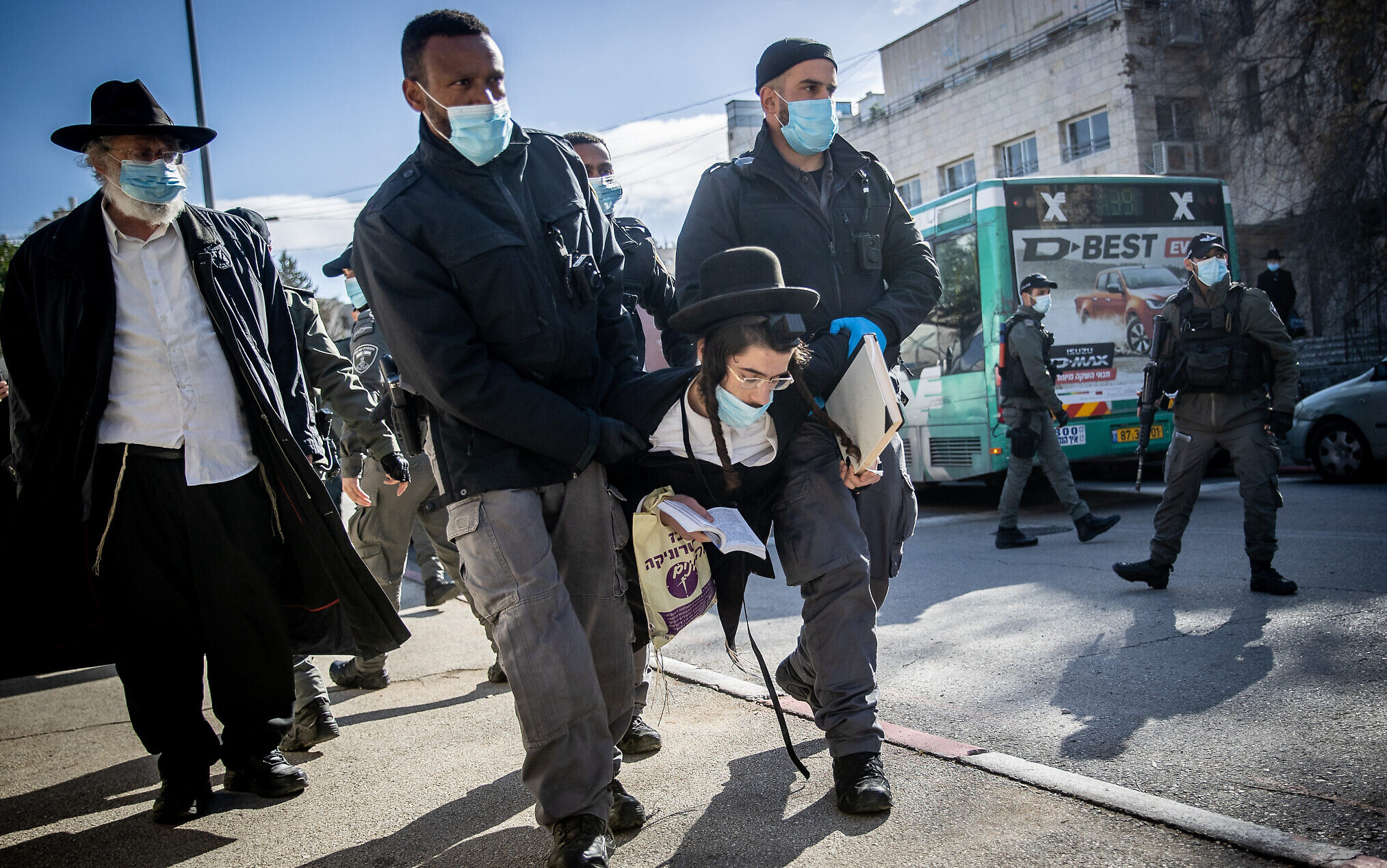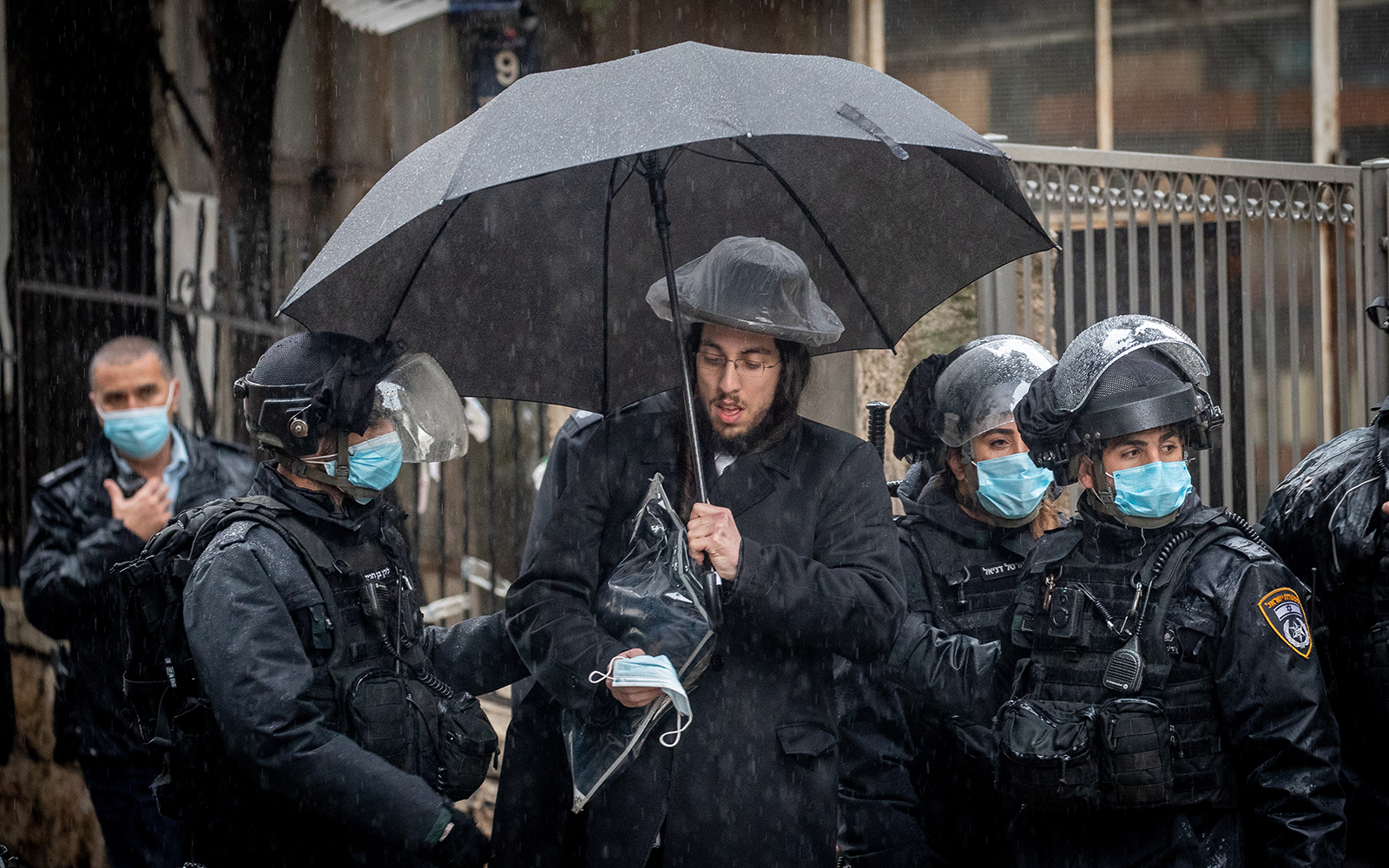PM says ‘we will act with a heavy hand’ after policewoman hurt in Bnei Brak; incident comes amid near-daily clashes over enforcement of virus rules

Prime Minister Benjamin Netanyahu vowed to act with a “heavy hand” against Israelis who violate coronavirus restrictions after a group of ultra-Orthodox men injured a policewoman while protesting the lockdown on Thursday.
The officer was injured when the men attacked a car she and another officer were traveling in during a patrol of the central city of Bnei Brak, smashing its windows and slashing its tires.
The incident came amid another day of violent pushback against enforcement of the national lockdown aimed at curbing the coronavirus pandemic.
Footage of the attack shows the crowd surrounding the car, pelting it with stones and smashing its windows with metal poles as some tried to open the doors.
The officers were traveling in an unmarked, civilian vehicle. It wasn’t immediately clear if they were in police uniform at the time of the attack or how the crowd recognized them as police. Some Hebrew media reports identified the officers as detectives.
The crowd had gathered as part of a protest against the closure of a yeshiva in the city which had opened in violation of the lockdown restrictions.
שוטרים מותקפים בלב בני ברק על ידי נערים מחסידות ויז’ניץ מנדלה הקיצונית.
אקס טריטוריה בלב הארץ pic.twitter.com/GXmknB51nd— אהרן רבינוביץ (@AronRabino1) January 21, 2021
Netanyahu said, “I strongly condemn the violence against the Israeli police operating in Bnei Brak and I am strengthening the hands of enforcement officials who are working to maintain Health Ministry regulations that save lives.
“We will act with a heavy hand against law-breakers, first and foremost against those who raised their hands against our policewomen and policemen,” Netanyahu said.
Critics have accused Netanyahu of avoiding cracking down on the Haredi public in order not to anger his ultra-Orthodox coalition partners.
More clashes broke out in the city in the early hours of Friday morning as dozens of police moved in to break up demonstrations that included city residents blocking streets and lighting tires on fire. At least three people were arrested, police said.
תיעוד: כוחות המשטרה עושים שימוש באמצעים לפיזור הפגנות. השוטרים התקבלו בקריאות “נאצים”
(צילום: חדשות כל העולם)@ittaishick pic.twitter.com/kMiuMgpjO4— כאן חדשות (@kann_news) January 21, 2021
Bnei Brak residents called police officers “Nazis” and officers used riot dispersal methods including flash grenades. The police raided at least one yeshiva in the city.
The rioters belong to an extremist faction of the Vizhnitz Hasidic sect, acccording to Hebrew media reports.
Following the attack on the policewoman on Thursday, the Israel Police said it “will not put up with blatant disturbances of public order, which pose a real risk to officers, and will work to bring the perpetrators to justice.”
Public Security Minister Amir Ohana called the incident a “savage and heinous crime” and that he said he would not allow it to go unpunished.
“The response will come, and fast,” Ohana said in a tweet.
Interior Minister Aryeh Deri, who heads the Haredi Shas party, described the attack as “outrageous,” saying, “We must stop the rioters and act against them in all seriousness. We must keep the guidelines and save lives.”
Earlier Thursday, Health Minister Yuli Edelstein called for jailing those who broke lockdown rules.
“In the Haredi world there is too much violation, but the mood has changed a bit,” Edelstein said in an interview with the Srugim website, which caters to the national Orthodox community.
Asked if he supports prison sentences for violators he responded, “Certainly.”

Netanyahu and Edelstein have made appeals in recent days to Rabbi Chaim Kanievsky, a leading ultra-Orthodox rabbi, asking that he influence the community to obey the lockdown.
There have been almost daily recent incidents during which police have faced violent resistance to enforcement of the lockdown by some parts of the ultra-Orthodox community.
Police upped their crackdown following media reports of previous lax enforcement, with figures showing that rates of handing out fines in Haredi neighborhoods are significantly lower than for the general population.
The lockdown, in its third week and extended to end on January 31, has shuttered all nonessential businesses and also closed down the entire education system, excluding special education.

However, media reports have shown that many in the ultra-Orthodox community are flouting the orders, keeping open Talmud Torah schools, which roughly cover grades 1-8, and Talmudic yeshivas. In addition, there have been incidences of weddings with hundreds of guests and prayer services attended by dozens despite the lockdown limiting indoor gatherings to just five people and outdoor gatherings to ten.
Aside from the confrontations in Bnei Brak, the Ynet news site reported Thursday that in Beit Shemesh, a city with a large Haredi population, ultra-Orthodox schools were open, with students piling into buses to get to school.
Ynet also reported that a Satmar Hasidic sect Talmud Torah school in Jerusalem, which made headlines the day before because of violent clashes as police raided the site, was operating as usual on Thursday, with residents saying that studies had restarted Wednesday minutes after police left.
Ynet said that a team of its reporters who arrived at the school’s location to film were attacked by local residents and chased away.
According to the report, whereas the Lithuanian streams of the Haredi community are largely keeping to the lockdown orders, there has been more widespread disobedience among Hasidic sects.
As reported by The Times of Israel
